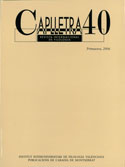Connectors i intencionalitat des de la perspectiva traductora: el cas de «pourtant»
DOI:
https://doi.org/10.7203/caplletra.40.4844Paraules clau:
Translation, French connector «pourtant» in Catalan and Spanish, Pragmatics Resum
Resum
The article sets out to relate the intentional element of discursive activity with some translating strategies, starting on the basis that the translated text, which is subjected to the demands of a prior communicative act, is a good tool to highlight both the intentional capacity of some linguistic resources and their constraints.
Many grammatical forms have an important role, as much or more than the one associated with lexical elements in the creation of this purpose. As a consequence, this paper is based on the analysis of the translation of the French connector pourtant into Catalan and Spanish in a corpus of literary texts and its respective translations. Particularly, it focuses on those ones which, despite their correctness at formal level, have discarded intentional aspects, so they have given rise to an eroded translation from the communicative point of view. At the same time, this work can be used to discover some semantic-pragmatic nuances attached to the connector pourtant that are more difficult to notice from a monolingual perspective.
 Descàrregues
Descàrregues
Descàrregues
Publicades
Com citar
-
Resum373
-
PDF143
Número
Secció
Llicència
L’autor o autora que adrece un treball a la redacció de Caplletra perquè siga publicat ha de ser la persona titular legítima dels drets d'explotació. La legitimació per a la publicació del treball ha d’incloure també les imatges, les taules, els gràfics i altres materials que puguen complementar el text, amb independència de si n'és l'autor o autora.
Copyright. Quan publica el treball en la revista, l'autor o autora cedeix a Caplletra. Revista Internacional de Filologia els drets d'explotació (reproducció, distribució i comunicació pública), tant per a l'edició impresa en paper com per a la versió electrònica, que serà accessible mitjançant la xarxa Internet.
Tots els treballs publicats en Caplletra es troben sota una llicència Creative Commons del tipus Reconeixement-NoComercial-SenseObraDerivada 4.0.
RESPONSABILITAT
Caplletra. Revista Internacional de Filologia no s'identifica necessàriament amb els punts de vista mantinguts en els treballs que publica.
Caplletra. Revista Internacional de Filologia declina tota responsabilitat derivada de qualsevol vulneració eventual dels drets de propietat intel·lectual que poguera ser duta a terme pels autors o autores.






